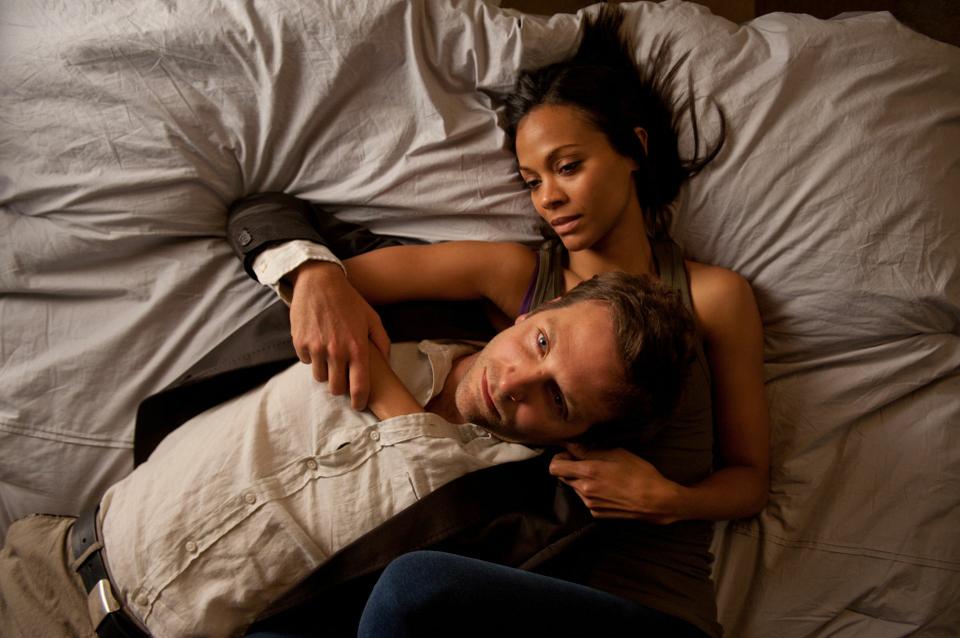
News
Cambridge Residents Slam Council Proposal to Delay Bike Lane Construction

News
‘Gender-Affirming Slay Fest’: Harvard College QSA Hosts Annual Queer Prom

News
‘Not Being Nerds’: Harvard Students Dance to Tinashe at Yardfest

News
Wrongful Death Trial Against CAMHS Employee Over 2015 Student Suicide To Begin Tuesday

News
Cornel West, Harvard Affiliates Call for University to Divest from ‘Israeli Apartheid’ at Rally
"The Words" Stumbles Over Sentimentality
The Words -- Dir. Brian Klugman and Lee Sternthal (CBS Films) -- 1.5 Stars

It doesn’t take a genius to realize that when you put Bradley Cooper next to Jeremy Irons on a park bench, someone’s acting chops just aren’t going to seem up to par. However, in the new drama “The Words,” the skill disparity between Cooper and Irons is nothing compared to that between the cast and first-time directors Brian Klugman and Lee Sternthal.
In the throes of a quarter-life crisis, a struggling, New York City author named Rory Jansen (Cooper) steals another man’s work and undergoes a crisis of conscience. Jansen’s story is only one of three narratives, which involve writers’ angst, heartbreaks, and secrets. Klugman and Sternthal attempt to handle two completely unrelated themes, one about facing the consequences of immoral actions and the other about a metaphysical statement concerning the relationship between truth and fiction. Whatever theory that emerges would have been better suited for a philosophy paper, not a motion picture drama where the potentially powerful themes are stripped of their complexity in favor of schmaltz.
In “The Words,” Jansen is joined by Clay Hammond (Dennis Quaid) and the Old Man (Irons)—three different generations yet all with the same problems. Olivia Wilde, Zoe Saldana, and Nora Arnezeder star as their respective love interests—who, sadly, play only peripheral roles in the story, leaving the three male leads to fumble with disposable material by themselves.
In a cutesy piece of narrative flair, Hammond writes a book about dastardly plagiarist Jansen, who, in a a fit of passionate desperation at not being able to buy drinks with his rich friends, stole the material for his “own” book from the Old Man. Quaid’s voice soothingly guides the audience through Jansen’s misdeed during a public reading of his book, called—you guessed it—”The Words.” With riveting lines like, “The Old Man waited in the rain,” Hammond’s storyline could have become even more of a complete bore if not for the presence of Daniella (Olivia Wilde) as a sexy grad student who bizarrely wants to seduce him.
After some necessary exposition about the crime and motive, Jansen is approached by the book’s true author, the aptly-named Old Man, and a third narrative appears, creating a Matryoshka doll script. “I just thought you should know the story behind the stories,” the Old Man teases. And just like that, the Old Man becomes our new narrator in a meta—and metastasizing—way.
Despite the journey deeper and deeper beneath degrees of separation from the present, there’s no depth to be found emotionally in this fiasco. Unsurprisingly, Jansen recieves a lesson about how great art can only come from the pain of life experience as the Old Man bemoans a tale of lost love, failed marriage, and the death of a child. Jansen realizes the relative mildness of his own “pain,” which essentially amounted to intellectual weakness. “I’m not who I thought I was, and I’m terrified that I never will be,” he whines earlier in the film to his wife. Irons acts sad. Cooper acts chastised. Lesson learned. End Act II.
Meanwhile, Hammond explains to Daniella the “pain” behind his own identifications with his characters. “There’s no moral [to Jansen’s story besides] the belief that after making one terrible mistake, one can continue to live, and live well.” To which Daniella deeply replies, “Bullshit,” eliciting a not-so-surprising end-game confession about Hammond’s novel.
Beyond the obvious over-simplifications, the film is as cheesy stylistically as it is thematically. As narrators take us further back in time, colors become matted and the film becomes grainier in a device never before used in film. Fading match-cuts between the Jansens and the young Old Man (Ben Barnes) and his love also adds a fresh, new way of connecting two storylines across time. A melodramatic and unoriginal score filled with acoustic guitar and light piano adds to the soapy mood. Because of all of these obviously unoriginal tropes, Klugman and Sternthal’s implied theory about the uncertanity of truth in fiction is overshadowed by the saccharine style.
It’s a shame that newcomers Klugman and Sternthal were unable to discuss this issue of truth more. Despite selling a film whose premise and bill reasonably suggest a good movie, the directors’ screen-time emphasis on canned emotional responses sadly distract from any larger moral to be gained.
—Staff writer Abigail F. Schoenberg can be reached at aschoenb@fas.harvard.edu.
Want to keep up with breaking news? Subscribe to our email newsletter.
